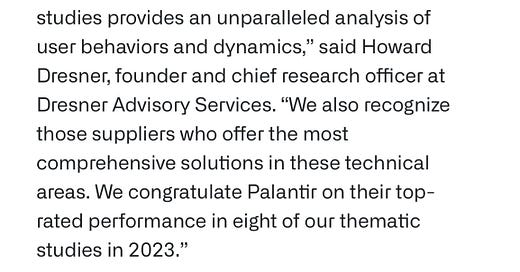Welcome back to DailyPalantir! Today we are going to be discussing Alex Karp’s latest article in TIME magazine, Palantir’s newest Space Partnership, and 8 awards they received this morning - let’s get into it!
New Awards
Palantir Wins Dresner Advisory Services 2023 Technology Innovation Award in Multiple Categories
Okay, so this was a pretty big deal. For those that don’t know, the Dresner Awards are some of the most important things CTOs at companies look at. Why?
It saves them time. It’s like advertisers that want to know what show has the best quality of ratings in order for them to run ads against it — they use Nielsen research because they can trust that Nielsen is actually going to give them the research they know they can rely on.
Some key reasons why the Dresner Tech Awards matter:
Customer-centric: Unlike many other tech awards, the Dresner Tech Awards are based solely on customer feedback and ratings. This means that the awards directly reflect the real-world experiences of users, making them a more credible and trustworthy source of information.
Rigorous methodology: The Dresner Tech Awards employ a rigorous methodology to collect and analyze customer data. This ensures that the results are statistically valid and representative of the broader market.
Independent recognition: As an independent analyst firm, Dresner Advisory Services is not beholden to any specific vendors or products. This means that the awards are seen as being objective and unbiased.
Vendor validation: Winning a Dresner Tech Award is a significant achievement for any vendor. It can help to validate a vendor's product claims, attract new customers, and improve brand reputation.
Customer insights: The Dresner Tech Awards also provide valuable insights into customer sentiment and satisfaction. This information can be used by vendors to improve their products and services.
In the context of Palantir, they basically interviewed a ton of customers using Foundry + AIP and asked them about how useful it is — and within 8 categories I showed in the above screenshot, Palantir was ranked number one in customer usage and satisfaction.
Again, if you are investing in Palantir, you are investing in one of the most exciting technology companies in the world that seriously has some of the most sophisticated technology — as validated by 3rd parties — that can be offered in enterprise and government software.
Going to Space
This was the press release that came out last week between Palantir and Voyager:
Palantir provides adaptable software solutions and architectures to ensure the resilience, effectiveness, and availability of U.S. defense and space capabilities. The collaboration between Voyager and Palantir will center around the joint exploration of cutting-edge Artificial Intelligence (AI) and Machine Learning (ML) capabilities, aimed towards technology demonstration missions on the International Space Station and the future Starlab commercial space station.
"This strategic collaboration signifies a major milestone in harnessing the combined expertise of Voyager and Palantir to elevate space domain security," said Marshall Smith, CTO of Voyager. "We are thrilled to collaborate with Palantir, exploring a diverse range of technologies and applications as we operate in a commercial space ecosystem."
As part of the agreement, Voyager and Palantir will explore the integration of Palantir's AI / ML and edge processing capabilities to support Starlab station development, manufacture, and future operations. Sample use cases include space domain awareness (SDA), data fusion, and processing at the edge to enable autonomous decisions and secure collaboration with Allies.
This alliance represents a shared commitment to advancing the frontiers of global commerce, civil, and national security capabilities, reaffirming the critical role industry has to bring leading-edge technology to the evolving landscape of space exploration and security," said Shyam Sankar, CTO of Palantir. "The opportunity to partner with Voyager will set the stage for collaboration across the ecosystem of leading technology firms dedicated to this mission."
The collaboration extends beyond the two companies, as both parties will actively identify opportunities for cooperation with other national security stakeholders. This includes government agencies, working groups, commercial partners, or partner nations, such as NATO or Five Eyes countries.
Okay, so this was really cool. Now, we know Palantir has a history of working in space related tasks because of their meta constellation product. Edge AI is very important here — and it’s the crux of this deal with Voyager because when you use any type of space technology, especially satellites, you need access to real time data.
Palantir’s edge AI technology connects software to sensors on satellites, enabling the immediate collection and analysis of data. This is particularly useful for applications such as autonomous vehicles and satellite missions where real-time data processing is critical. Palantir's entry into the space domain is not just about military applications; it also has implications for climate change monitoring, disaster management, and supply chain optimization. The ability to track natural disasters and make minute-by-minute decisions can potentially save lives and resources, showcasing the versatility and potential of Palantir's technology in space.
Now, the partnership with Voyager is a MOU, or memorandum of understanding, so the deal is agreed upon but they are still working out the details in terms of how they will work together. One of the reasons Space is a MAJOR frontier for Palantir is because…
They have a relationship with another company — Satellogic, a company specializing in high-resolution satellite imagery. This collaboration was designed to harness the strengths of both companies to revolutionize the way satellite data is used for decision-making across various sectors. Satellogic's mission is to create a live catalog of Earth, providing daily updates through their satellite imagery, which can be used to address critical global challenges. Palantir, on the other hand, brings to the table its advanced data analytics capabilities, including its Meta Constellation project and Edge AI technology.
The partnership makes a lot of sense with Palantir's software enhancing the processing and analysis of Satellogic's satellite images. It’s expected to supercharge the capabilities of both companies, offering advanced geospatial products and tailored AI insights. Foundry basically acts as a centralized data analytics platform, integrating comprehensive data management and providing a holistic view of data analytics.
Space is really, really exciting.
Palantir is also exciting because all of the different applications they can work in, including space.
Any vertical can take off, healthcare being the main one over the past year that really has, but it’ll be interesting to keep and eye out for what they are doing in Space and how big that market can become as it becomes commercialized and governments aim to have marketshare in the space economy.
Alex Karp’s Latest Article
Alex Karp doesn’t care anymore. His upcoming book, The Technological Republic, is going to be critique of how Silicon Valley has operated over the past 20 years. In his latest article, he argues for the declining values of the west.
It’s a long article, but he ends by saying this:
The dystopian future that Orwell and others have imagined may be near, but not because of the surveillance state or contraptions built by Silicon Valley giants that rob us of our privacy or most intimate moments alone. It is we, not our technical creations, who are to blame, for failing to encourage and enable the radical act of belief in something above and beyond, and external to, the self.
Essentially, the argument Karp is making here is that Silicon Valley has created these “half truths” around capturing people’s attention and then trying to monetize it. As a result, we start to believe things that probably don’t make sense — Karp uses what is happening in Harvard with professions unable to say a genocide on Jewish people is bad as a core example for how the values Silicon Valley is exporting around the world are becoming unsustainable.
The reason Palantir is getting employees from across the tech sector to want to work with them over Google is because people want to do more than optimizing advertising, they want to have a purpose.
I think Karp’s book is going to speak to this in even greater depth and explain why Palantir chose to take up contracts like Project Maven when Google decided not to after employee backlash. One company is constantly trying to innovate and have purpose guide their work, another is focused on the most effective advertising.
It’s not that advertising is a bad business, it’s that Google has so many resources and they haven’t done anything innovative with all the cash they have. Karp’s argument is that this is the far majority of Silicon Valley companies that have convinced the world they are doing something important, like building the metaverse, when in reality, there are plenty of problems to deal with on Earth that are likely more important.
I analyzed this more here in Karp’s latest interview.
That’s it for me — thank you for reading & I’ll see you tomorrow in your inbox!







Great Job Amit ! I am very impressed for your hard work and consistency. You will do good... YOu are passionate about your job... money will follow... Bravo ! and Please do me a favour... when you mention my name in the Open/Close Market... please please please... It is V A L E R I O with an I, not VALERO... 😂